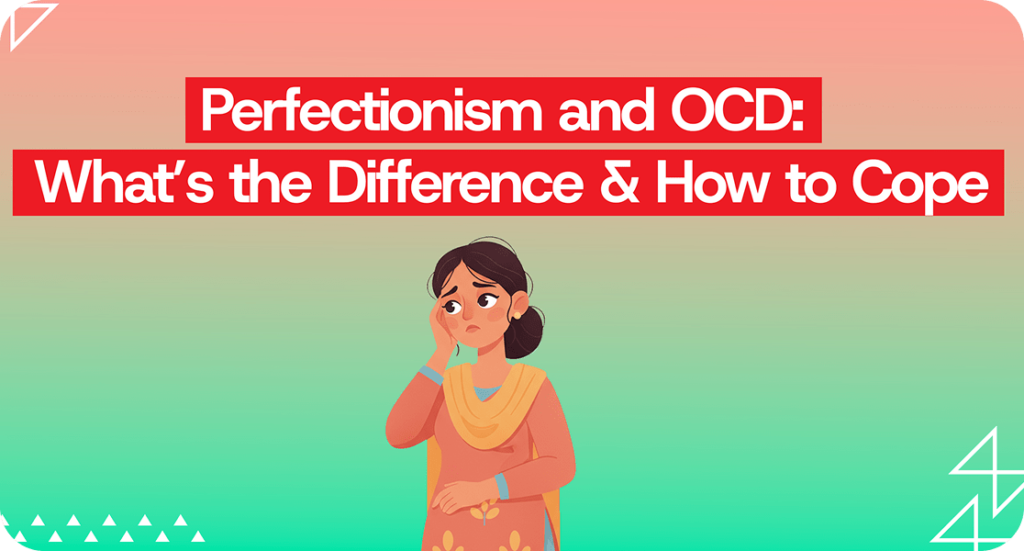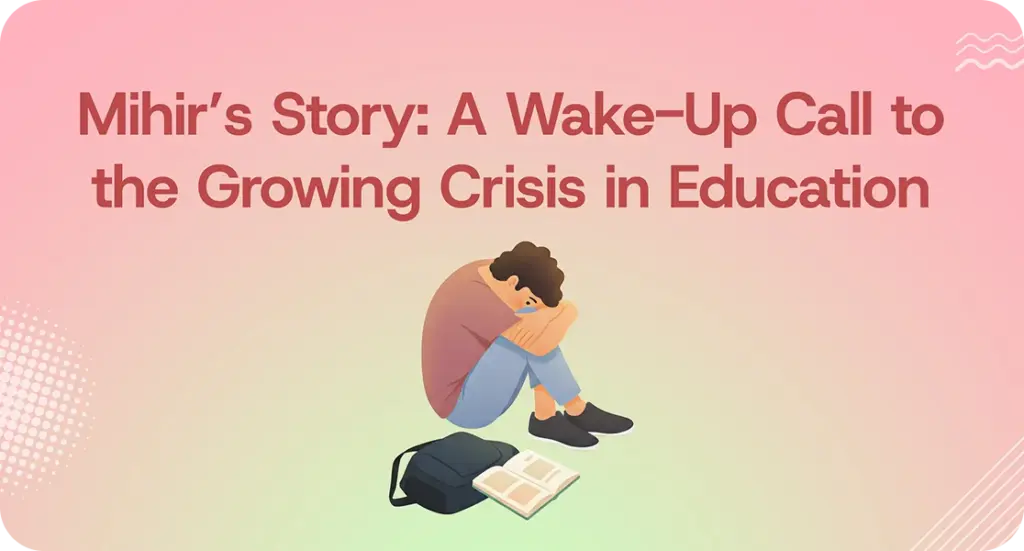
Rebuild and strengthen your relationship— especially after a major issue — can feel overwhelming. Don’t expect things to go back to normal overnight. Healing takes time, effort, and a shared commitment to grow. Your partner needs to see your trust, consistency, and willingness to change. This process requires hard work, but it’s doable. Setbacks like these are common in relationships, but they can affect the relationship’s stability. So, it’s essential to handle them with care and sensitivity to ensure a healthy and positive outcome.
Reconnecting and strengthening your relationship after a rough patch requires effort, commitment, and a willingness to work together.
Reconnecting and strengthening your relationship after a rough patch requires effort, commitment, and a willingness to work together.
Need to Talk to Someone?
Book a private online session with a licensed therapist
Proven Steps to Rebuild and Strengthen Your Relationship After a Conflict
1. Acknowledge and Accept
Acknowledge the rough patch and accept that it’s a normal part of any relationship. Avoid blaming or denying the issues.
2. Communicate Openly
Communicate openly and honestly with each other. Share your feelings, concerns, and needs. Listen actively and empathetically.
3. Identify the Root Cause
Identify the root cause of the rough patch. Was it a specific incident, a communication breakdown, or a deeper issue? Understanding the root cause can help you address it.
4. Schedule Quality Time
Schedule quality time together, doing activities you both enjoy. This can help you reconnect and strengthen your bond.
5. Practice Forgiveness and Understanding
Practice forgiveness and understanding. Let go of grudges and resentments. Work towards understanding each other’s perspectives and needs.
6. Seek Professional Help
Consider seeking professional help from a couples therapist in kerala or counselor. They can provide guidance, support, and tools to help you reconnect.
Need someone to talk to? Oppam is here to listen and offer support. Consider Oppam is your best bet for a supportive conversation
How to reconnect after relationship problems
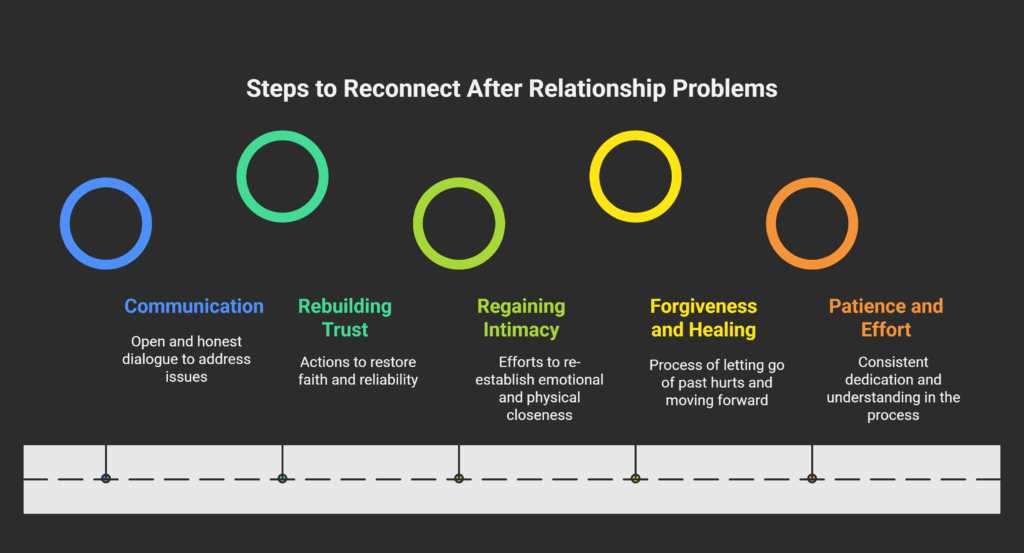
1. communication
Effective communication is crucial in relationships, especially after problems arise. Ignoring or downplaying issues can exacerbate the situation, while open discussion can help resolve them.
Key Communication Strategies
- Discuss feelings and concerns: Share your emotions and thoughts with your partner.
- Understand each other’s perspectives: Listen actively and validate each other’s feelings.
- Identify underlying causes: Understand the root causes of the problem and discuss ways to prevent similar issues in the future.
Active Listening
- Listen attentively: Pay attention to your partner’s words, tone, and body language.
- Validate emotions: Acknowledge and validate your partner’s feelings.
- Avoid blame: Use “I” statements to express your thoughts and feelings without blaming your partner.
Benefits of Effective Communication
- Resolves conflicts: Effective communication can help resolve conflicts and strengthen the relationship.
- Builds trust: Open and honest communication fosters trust and understanding.
- Prevents future problems: Identifying underlying causes and discussing solutions can help prevent similar problems in the future.
2. Rebuilding Trust
After a problem arises, it’s essential to acknowledge and take responsibility for your actions. Apologising and owning up to your mistakes can help reduce tension and rebuild trust.
Key Strategies
- Acknowledge mistakes: Recognize your role in the problem and take responsibility.
- Apologize sincerely: Offer genuine apologies to show remorse and commitment to change.
- Follow through on commitments: Keep your promises to demonstrate reliability.
- Be transparent: Maintain open and honest communication to foster trust.
Benefits of Rebuilding Trust
- Strengthens relationship: Rebuilding trust can strengthen the bond between partners.
- Fosters reliability: Following through on commitments demonstrates reliability.
- Promotes open communication: Transparency and honesty promote open and effective communication.
3. Regaining Intimacy
After a problem arises in a relationship, partners may feel a natural distance or defensiveness. To regain intimacy, it’s essential to:
Key Strategies
- Schedule quality time: Plan regular date nights and activities to strengthen the bond.
- Show affection: Display physical affection to reduce tension and increase closeness.
- Reconnect emotionally: Engage in meaningful conversations and shared activities to rebuild emotional intimacy.
Benefits of Regaining Intimacy
- Strengthens relationship: Regaining intimacy can strengthen the bond between partners.
- Increases happiness: Quality time and affection can increase happiness in the relationship.
- Fosters emotional connection: Emotional reconnection can help partners feel more connected and secure.
Tips for Emotional Reconnection
- Meaningful conversations: Engage in deep, meaningful conversations to rebuild emotional intimacy.
- Shared activities: Participate in activities and games that bring joy and closeness.
- Physical touch: Display physical affection to show love and care.
4. Forgiveness and Healing
After a problem arises in a relationship, it’s essential to work towards forgiveness and healing. This involves:
Key Strategies
- Let go of resentment: Focus on forgiveness and moving forward.
- Rebuild the relationship: Prioritize rebuilding and strengthening the relationship.
- Focus on the present: Concentrate on the present moment and future goals.
Benefits of Forgiveness and Healing
- Healthy relationship: Forgiveness and healing can help maintain a healthy relationship.
- Reduced stress: Letting go of negative emotions can reduce stress and tension.
- Stronger bond: Rebuilding the relationship can strengthen the bond between partners.
Seeking Professional Help
- Couples therapy: Consider seeking professional help through couples therapy or online therapy. Consider couples therapy for relationship healing, and also online therapy to reconnect with your partner.
- Relationship healing: A therapist can help partners work through issues and rebuild their relationship. Heal your relationship with Oppam support.
Feeling Overwhelmed?
You’re Not Alone. Get Support from an
Oppam Therapist Wherever You Are
Oppam Therapist Wherever You Are
Importance of Healing
- Natural part of relationships: Problems and conflicts are a natural part of any relationship.
- Key to a healthy relationship: Healing and rebuilding are crucial for maintaining a healthy and fulfilling relationship.
5. Patience and Effort
Rebuilding a relationship requires time, effort, and patience. It’s essential to:
Key Strategies
- Be patient: Understand that rebuilding a relationship takes time and effort.
- Collaborative work: Work together with your partner to overcome challenges and strengthen the relationship.
- Celebrate small wins: Acknowledge and celebrate small victories and changes to foster a healthier relationship.
Benefits of Patience and Effort
- Healthier relationship: Patience and effort can lead to a stronger and more resilient relationship.
- Long-term success: By working together and celebrating small wins, partners can build a long-lasting relationship.
- Increased trust: Collaborative work and patience can help rebuild trust and strengthen the bond between partners.
Healing emotional distance in relationships
Healing emotional distance in relationships requires effort, empathy, and effective communication. Here are some steps to help you bridge the gap:
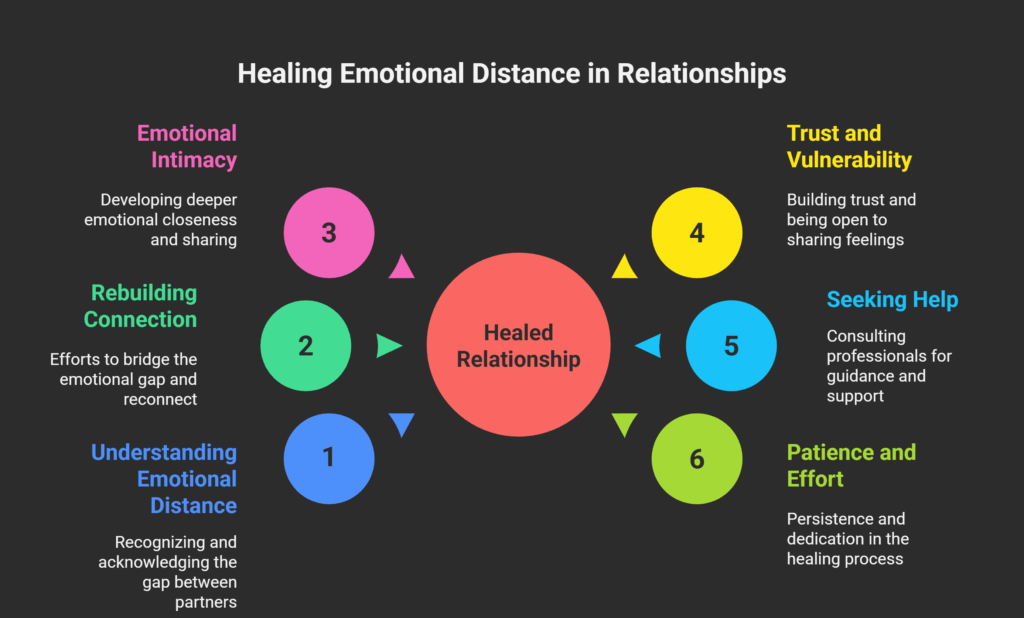
1. Understanding Emotional Distance
- Identify the causes: Reflect on the reasons behind the emotional distance, such as stress, trauma, or communication issues.
- Acknowledge feelings: Recognize and validate each other’s emotions.
2. Rebuilding Connection
- Communicate openly: Share your thoughts, feelings, and desires in a non-judgmental space.
- Active listening: Pay attention to your partner’s words, tone, and body language.
- Show empathy: Try to understand your partner’s perspective and feelings.
3. Emotional Intimacy
- Schedule quality time: Regularly spend quality time together, engaging in activities you both enjoy.
- Physical touch: Display physical affection like hugs, kisses, or cuddles.
- Meaningful conversations: Engage in deep, meaningful conversations to reconnect.
4. Trust and Vulnerability
- Build trust: Work on rebuilding trust by being reliable, transparent, and honest.
- Be vulnerable: Share your fears, desires, and emotions to create a deeper connection.
5. Seeking Help
- Couples therapy: Consider seeking professional help to work through challenges. consider couples therapy for relationship healing and also online therapy to reconnect with your partner.
- Relationship counseling: A therapist can provide guidance and support. Heal your relationship with Oppam support. Book a session to reconnect at Oppam.
6.Patience and Effort
- Be patient: Healing emotional distance takes time and effort.
- Work together: Collaborate to overcome challenges and strengthen your bond.
How to rebuild trust, love, and connection
As mentioned earlier, problems in relationships can aid in the growth of a healthy relationship. However, if these issues are not resolved properly, they can cause emotional pain and sometimes lead to trauma.
Regaining lost trust in a relationship is a time-consuming process. The first thing to learn is to be patient and understand that it will take time. It’s essential to acknowledge that rebuilding trust requires effort and commitment from both partners.
Regaining lost trust in a relationship is a time-consuming process. The first thing to learn is to be patient and understand that it will take time. It’s essential to acknowledge that rebuilding trust requires effort and commitment from both partners.
Some key points to consider when rebuilding trust:
- Understand that trust must be earned
- Be patient and give it time
- Communicate openly and honestly
- Be consistent and reliable
- Avoid blaming or becoming defensive
- Focus on rebuilding emotional intimacy
1.Effective communication:
Communicating effectively is essential to avoid misunderstandings and resolve relationship issues. It’s not necessary to regain trust immediately, but rather take time to openly and clearly communicate with your partner, understanding them, and showing willingness to change.
2. Set boundaries:
- Setting boundaries is essential in any relationship.
- Establishing boundaries is crucial for maintaining a healthy relationship. Boundaries help maintain mutual respect, dignity, and individuality, while preventing manipulation and abusive behaviors.
- Remember, you deserve to be in a relationship where your partner respects and values your autonomy, individuality, and happiness. Don’t be afraid to take control of your life and make the difficult decision to walk away if necessary
3. Active listening:
- Listening is just as important as communication. After a problem arises and you’re ready to resolve it, you must be willing to listen to your partner.
- Simply hearing them is not enough; you must actively listen to what they say. When you actively listen, you show that you’re interested in what your partner is saying and that you care about their thoughts.
- Moreover, active listening helps you understand things correctly.
4. Seek professional help:
If needed, consider seeking professional help from a therapist or counselor.Seeking professional help is a great step in rebuilding your relationship after a fight. Couples therapy in kerala can provide a supportive environment to work through issues and develop healthier communication patterns. Book an online therapist at Oppam.
Some benefits of seeking professional help include:
- Improved Communication: Learning how to express yourself effectively and listen actively to your partner.
- Conflict Resolution: Developing strategies to resolve conflicts in a healthy and constructive way.
- Deeper Understanding: Gaining insight into each other’s perspectives, needs, and emotions.
- Strengthened Bond: Rebuilding trust, intimacy, and emotional connection.
5. Be empathetic:
- It’s essential to understand that after a problem arises, both partners are affected. Being empathetic helps you understand your partner’s feelings and emotions better.
- You can only say you’ve truly learned your partner when you’re empathetic, can fully understand them, and think from their perspective.
- Growing from being sympathetic to being empathic largely depends on understanding your partner’s different goals
6. Understand each other:
- Often, after a problem arises, we’re not willing to understand our partner. Instead, we focus on justifying our side and proving that we’re not wrong.
- Meanwhile, we might overlook our partner’s emotional state and the distress they’ve experienced.
- Understanding each other after a problem helps to heal the relationship. Communicating through talking or even notes can be beneficial.
7. Forgiveness:
Forgiveness is essential in any relationship. Forgiveness is a crucial step in healing and rebuilding your relationship after a fight.
Forgiveness doesn't mean:
- Forgetting: Ignoring the hurt or neglecting the issue.
- Condoning: Excusing or justifying the hurtful behavior.
- Reconciling: Automatically going back to the way things were.
Forgiveness doesn't mean:
- Letting go: Releasing the negative emotions associated with the hurt.
- Moving forward: Focusing on healing and rebuilding the relationship.
- Creating a new beginning: Starting fresh, with a renewed commitment to communication, empathy, and understanding.
8. Honesty:
- Being honest is crucial when in a relationship. When you’re honest, you’re transparent with your partner, which helps avoid misunderstandings and other issues.
- Especially after a problem arises, it’s vital to handle things carefully. Make a conscious effort to be honest with each other.
9. Healing time:
- After a problem arises, it’s essential to acknowledge and accept that emotional and mental healing takes time.
- Sometimes, after a fight, your partner might not want to talk to you or face you. In such situations, it’s crucial to give them space and time to heal without getting angry or frustrated. This allows them to process their emotions and reflect on the issue.
- Meanwhile, you also get time to sit down, think about the problems, and heal from the pain you’ve experienced.
How to repair a strained relationship
Repairing a strained relationship requires effort, empathy, and effective communication. Here are some steps to help you repair a strained relationship:
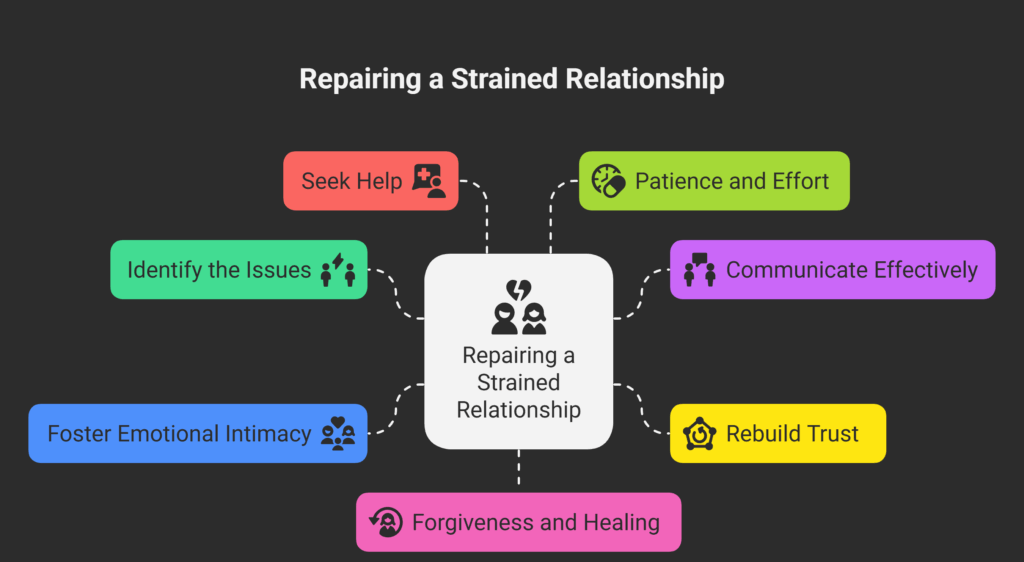
1.Identify the Issues
- Reflect on the problems: Understand the root causes of the strain.
- Acknowledge feelings: Recognise and validate each other’s emotions.
2.Communicate Effectively
- Open and honest communication: Talk about your feelings, needs, and concerns.
- Active listening: Pay attention to your partner’s perspective and validate their emotions.
- Use “I” statements: Express your feelings and thoughts using “I” statements.
3. Rebuild Trust
- Follow through on commitments: Show reliability and follow through on your promises.
- Transparency: Be open and honest in your communication.
- Consistency: Consistently demonstrate positive behaviors.
4.Foster Emotional Intimacy
- Quality time: Spend quality time together, engaging in activities you both enjoy.
- Emotional connection: Foster emotional intimacy by sharing your thoughts, feelings, and desires.
- Physical touch: Display physical affection like hugs, kisses, or cuddles.
5. Seek Help
- Couples therapy: Consider seeking professional help to work through challenges. consider couples therapy for relationship healing and online therapy to reconnect with your partner.
- Relationship counseling: A therapist can provide guidance and support. Consider Oppam couples’ reconnection therapies. Heal your relationship with Oppam support.
6.Patience and Effort
- Be patient: Repairing a strained relationship takes time and effort.
- Work together: Collaborate to overcome challenges and strengthen your bond.
7. Forgiveness and Healing
- Let go of resentment: Work towards forgiveness and letting go of negative emotions.
- Focus on the present: Concentrate on rebuilding your relationship in the present moment.
Managing emotional triggers in relationships
Emotional regulation is a crucial skill to have in any relationship. After a conflict, emotional regulation can be challenging.
1. Identify the emotion:
The first step is to accurately identify what you’re feeling at the moment. We can experience a range of emotions like anger, sadness, happiness, discomfort, etc. After a conflict, several negative emotions can pass through us. Understanding them correctly is the first step.
2. Understand triggers:
The next step is to identify the emotional triggers that led to the conflict. Triggers can include feelings of blame, isolation, or being ignored by your partner. These triggers can vary in intensity and differ from person to person. It’s essential to understand the triggers that lead to conflict in your relationship and discuss them with your partner
3. Mindfulness/Self-Awareness Practices:
Self-awareness helps you understand your strengths and weaknesses. Through practices like mindfulness, you can enhance this skill and develop a positive personality.
Some self-awareness practices include:
- Mindfulness
- Journaling
- Feedback
- Introspection
- Emotional intelligence
4. Professional help
- A therapist can help you both identify the underlying causes of the conflict, teach you effective communication skills, and provide guidance on how to navigate future disagreements. They can also offer insights that may be hard to see from within the relationship.
- If you are struggling with arguments and you don’t know how to solve it scientifically then book a conflict resolution therapy with Oppam.
5. Create a positive environment:
- Emotions are closely linked to our environment. No matter how hard we try to stay positive, a negative environment can lead to various problems.
- A positive environment, on the other hand, supports emotional well-being and emotional regulation.
If you’re finding it challenging to deal with issues in your relationship or if they’re significantly impacting your well-being, our expert online therapists in kerala are here to support you.
Struggling to resolve conflicts in your relationship? OPPAM’s experienced therapists can help you find healthier ways to connect.
Struggling to resolve conflicts in your relationship? OPPAM’s experienced therapists can help you find healthier ways to connect.
Struggling?
Talk to an Oppam Therapist
Get the Support You Deserve Online & Confidential
